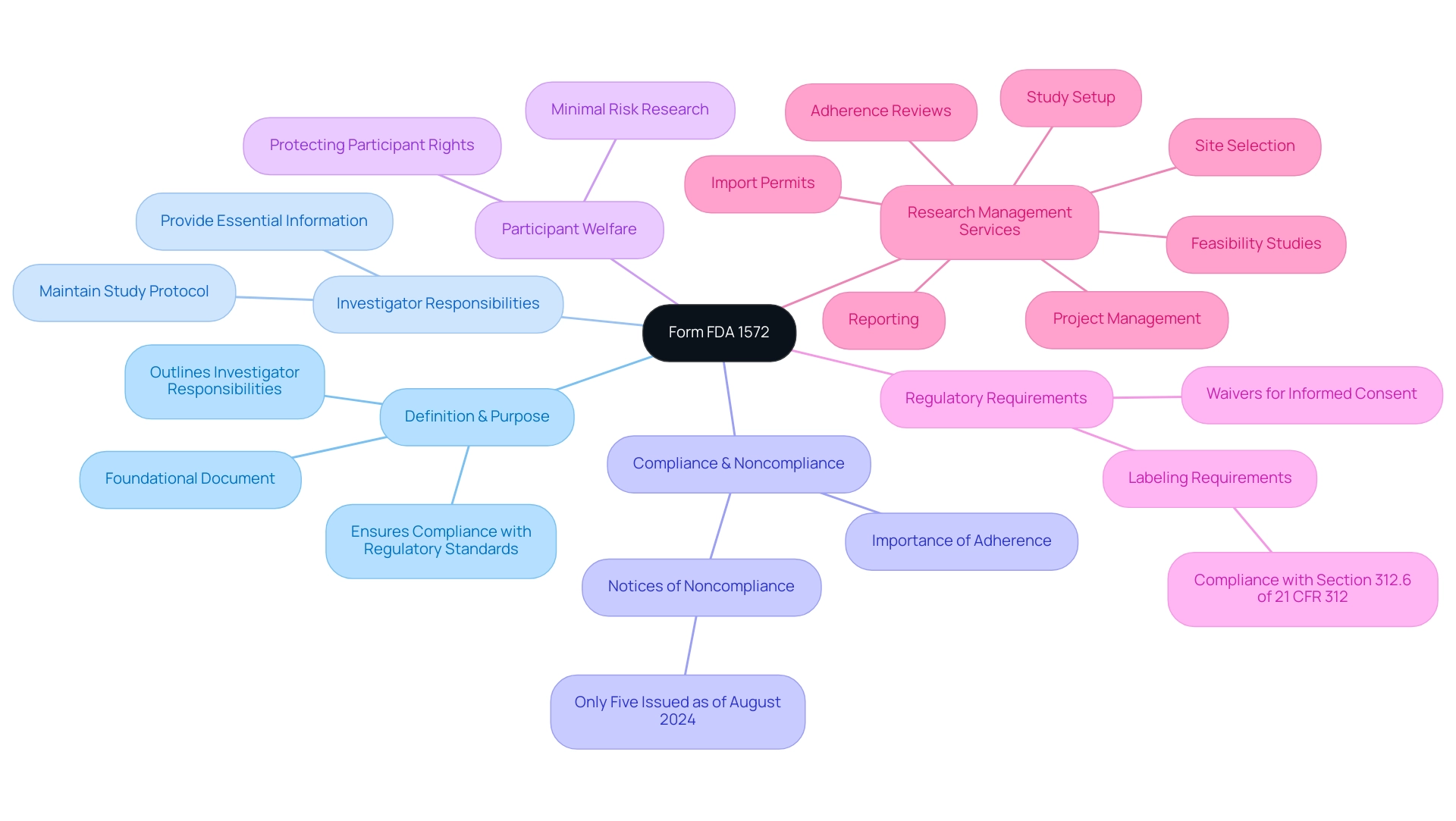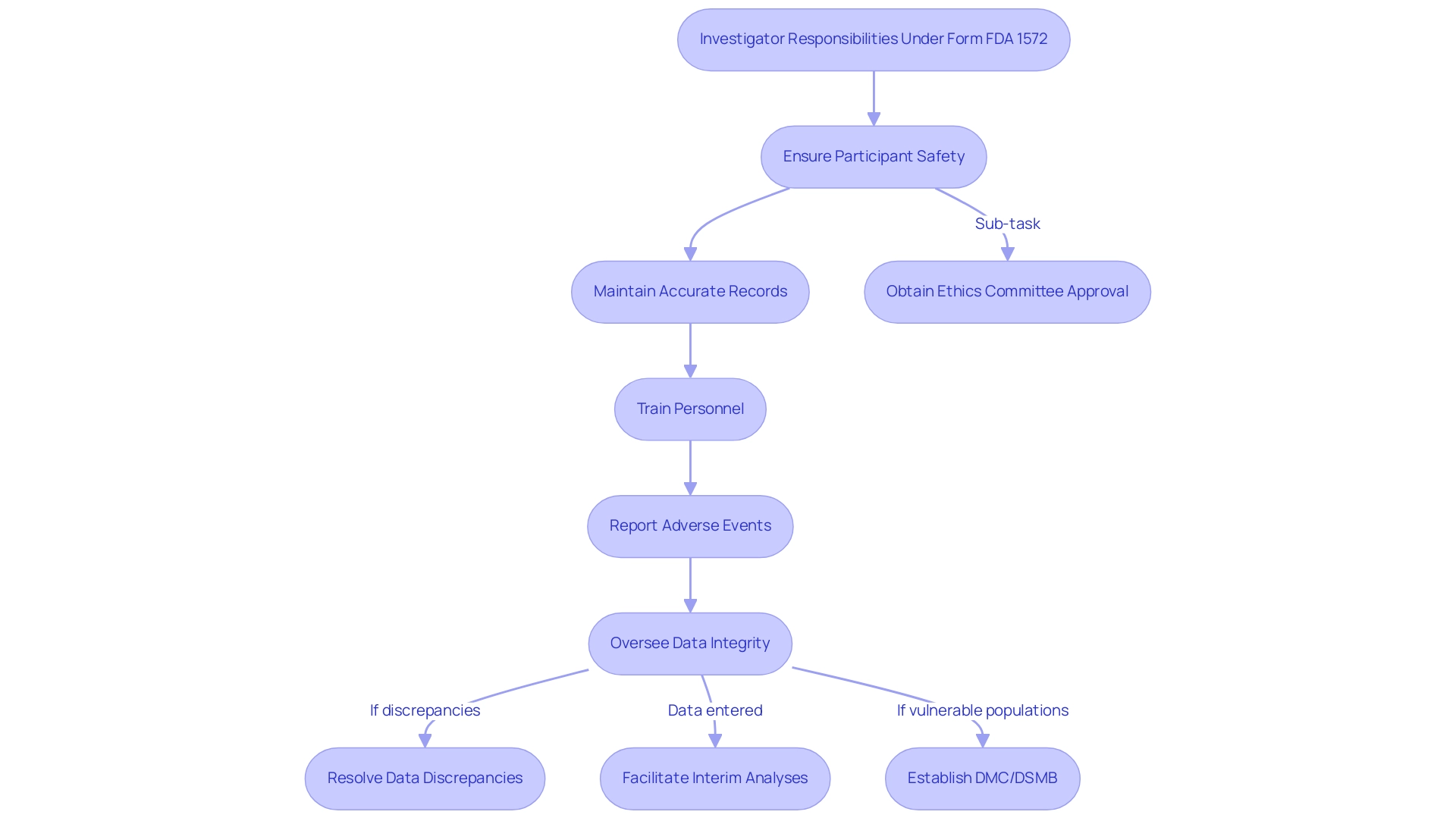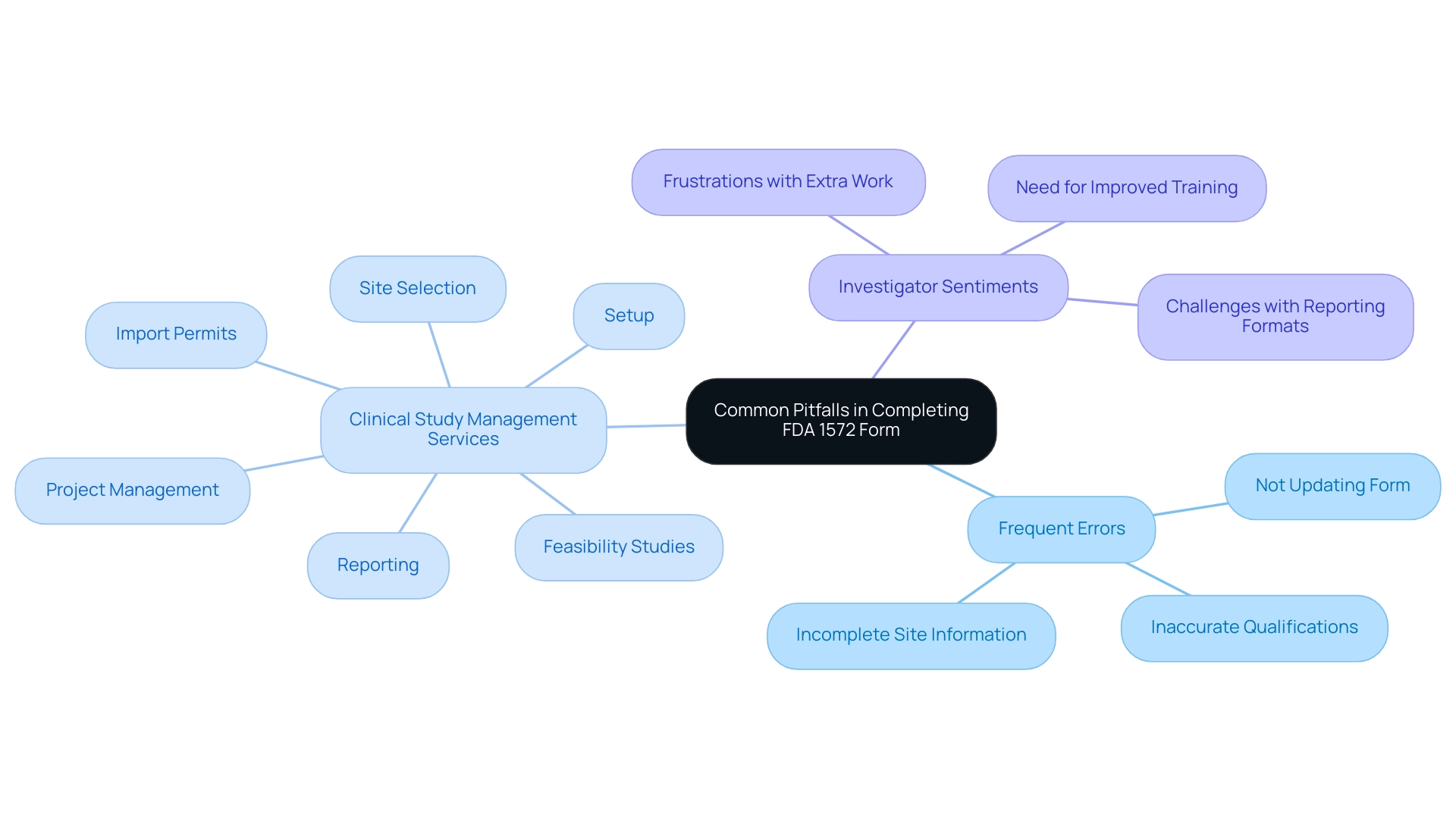Introduction
In the intricate landscape of clinical research, the Form FDA 1572 stands as a pivotal document that delineates the responsibilities and commitments of investigators. This form, often referred to as the Statement of Investigator, is not merely a bureaucratic requirement; it is essential for ensuring that clinical trials adhere to the stringent regulatory standards set forth by the U.S. Food and Drug Administration (FDA). By providing critical information about the trial site, investigator qualifications, and study protocols, the Form FDA 1572 plays a crucial role in protecting participant welfare and maintaining the integrity of clinical investigations. As the regulatory environment continues to evolve, understanding the nuances of this form becomes increasingly vital for investigators seeking to navigate the complexities of compliance and uphold ethical standards in their research endeavors.
Understanding the Form FDA 1572: Definition and Purpose
The Form FDA 1572, often known as the Statement of Investigator, explains what is a 1572 form and serves as a foundational document in the field of clinical research by outlining the responsibilities of investigators conducting clinical studies. What is a 1572 form is required by the U.S. Food and Drug Administration (FDA) and is integral to ensuring compliance with regulatory standards. Its primary function is to provide essential information regarding the research site, the qualifications of the investigator, and the study protocol.
By setting these crucial parameters, the Form FDA 1572 plays a vital role in protecting participant welfare and maintaining the integrity of research studies. According to recent data, as of August 2024, the FDA has issued only five Notices of Noncompliance, indicating a strong trend towards adherence among trial investigators. The focus on adherence highlights what is a 1572 form and its importance in upholding the highest standards of medical research.
Regulatory specialists have observed that, 'The medical investigation could not practicably be conducted without the waiver,' emphasizing the form's importance in enabling research while ensuring ethical oversight. Additionally, for a waiver or alteration of consent to be approved, the research must involve minimal risk and not adversely affect participant rights and welfare. Furthermore, compliance with labeling requirements, as outlined in Section 312.6 of 21 CFR 312, reinforces the importance of clear communication regarding investigational products, ensuring that labels accurately reflect the drugs’ investigational status and do not mislead regarding safety or effectiveness.
Understanding what is a 1572 form and its interconnectedness with regulatory requirements and the potential for waivers is crucial for the successful conduct of research studies. Notably, the Ethics Committee (EC) may waive the requirement for a signed Informed Consent Form (ICF) under certain conditions, such as minimal risk research or cultural norms against signing, which reflects the evolving landscape of research regulations. In this context, our extensive research management services—including feasibility studies, site selection, adherence reviews, study setup, import permits, project management, and reporting—are intended to assist researchers like Katherine Ruiz, an expert in regulatory affairs for medical devices and in vitro diagnostics in Colombia.
Each of these services is customized to ensure adherence to what is a 1572 form requirements, facilitating a smooth study process and safeguarding participant welfare.

Key Procedures: Signing and Updating the Form FDA 1572
Before the commencement of any clinical study, it is essential to understand what is a 1572 form, as signing it is a prerequisite. This form acts as a formal declaration from investigators, affirming their commitment to adhere to both the research protocol and the stringent regulatory requirements set forth by the FDA. It is essential that this form is not only signed but also updated regularly to reflect significant changes that may occur during the study, including variations in the study protocol, shifts in the list of investigators, or modifications to site information.
Frequent updates are essential for upholding regulations, as they guarantee that all participants in the research are kept informed of any changes that could affect the execution of the study.
In 2020, a significant 64.6% of active studies were open to accrual and recruiting, yet many faced challenges, with some reporting unknown status. Compounding these challenges, 9 registered studies did not report their phase, which highlights the importance of accurate and timely documentation. As research expert Mike Martin highlights, 'The role of the research associate may be crucial in tackling challenges related to the adoption of digital tools,' emphasizing the necessity for attentiveness in regulatory matters.
Moreover, an analysis of satisfaction levels among investigators showed that those managing one Form 1572 are not significantly more dissatisfied than those supervising multiple forms, although they display slightly less enthusiasm to keep participating in research studies. This highlights the importance of understanding what is a 1572 form and following the related procedures, ensuring that both investigators and sponsors align with regulatory expectations to facilitate ongoing, effective medical research. Furthermore, the continuous influence of virtual and remote assistance on conventional research execution models cannot be ignored, as these factors are progressively shaping the environment of regulations and operational difficulties in studies.
Our extensive research management services, guided by specialists such as Katherine Ruiz and Juan Cuya, include feasibility assessments, site selection, compliance evaluations, project initiation, import permits, project oversight, and reporting, featuring the review and feedback on research documents to meet national requirements, ensuring successful implementation and adherence to regulatory standards.

Investigator Responsibilities Under the Form FDA 1572
Signing what is a 1572 form entails a multitude of vital responsibilities for clinical study investigators, particularly within the context of comprehensive clinical study management services. Primarily, investigators are tasked with ensuring the safety and welfare of participants, which includes strict adherence to the approved protocol and maintaining accurate records throughout the process. This is where our service capabilities come into play, assisting with feasibility assessments, site selection, and setup for testing, including obtaining ethics committee approval, to ensure that research sites meet the necessary compliance standards established by local authorities such as INVIMA, Colombia's National Food and Drug Surveillance Institute.
Investigators also play a crucial role in guaranteeing that all personnel involved in the testing are adequately trained and possess the necessary qualifications to perform their duties effectively. This training is essential to uphold the integrity of the process and comply with regulatory expectations. Moreover, they must report any adverse events or protocol deviations promptly to the relevant parties, including the sponsor and regulatory authorities.
According to Beverley Adams-Huet, an expert in the field, 'Statisticians provide design advice and develop the statistical methods that best correspond to the research hypothesis,' emphasizing the importance of robust statistical practices in monitoring and reporting outcomes.
In addition to these responsibilities, our services include assisting in study setup, obtaining import permits, and ensuring smooth project management and monitoring throughout the research. Investigators must ensure that data is entered into the database promptly to facilitate interim analyses, which is essential for maintaining study integrity. For studies involving vulnerable populations or significant risks, the establishment of a Data Monitoring Committee (DMC) or Data Safety Monitoring Board (DSMB) is mandated to oversee participant safety.
Furthermore, any discrepancies in data should be resolved according to the monitoring plan, with the site principal investigator signing off on changes. By diligently meeting these obligations, investigators not only uphold the integrity of the examination but also improve the potential for successful results in medical research, as demonstrated in cases like the NRG Oncology Trial GU002, which seeks to evaluate new treatment effectiveness in high-risk cancer patients.

Avoiding Common Pitfalls: Mistakes in Completing the Form FDA 1572
Frequent errors in filling out what is a 1572 form can greatly impact the adherence and integrity of clinical studies. Investigators often overlook the necessity of updating the form when there are changes in research personnel or modifications to the protocol. Moreover, inaccuracies concerning the investigator's qualifications and incomplete information about the site can result in significant regulatory issues.
A recent research indicated that 40.0% of investigators reported no effect from the frequency of patient visits, suggesting a disconnect between procedural requirements and practical execution, which could lead to oversight in adherence. To mitigate these risks, it is crucial for investigators and their teams to conduct thorough reviews of the form and ensure that all information is accurate and complete. Regular communication about any changes that may necessitate updates is also essential.
As Katherine Ruiz, a specialist in regulatory affairs for medical devices and in vitro diagnostics in Colombia, emphasizes, tackling these engagement issues not only improves compliance but also fosters the overall integrity of the research process. Moreover, the extensive clinical study management services we provide encompass:
- Feasibility studies
- Site selection
- Setup
- Import permits
- Project management
- Reporting of study status, inventory, and adverse events
As one investigator noted, two factors complicate participation in trials:
'Extra work for unclear purpose that delays scientific progress' and
'The stringent formats of reporting that make it challenging and more time-consuming than necessary.'
This underscores the frustrations faced by investigators, further emphasizing the need for improved compliance practices. Moreover, the anticipated revisions and clarifications of local laws in EU countries, influenced by major regulatory changes, including Brexit and the implementation of the GDPR, may also impact what is a 1572 form. The case examination on Investigator and Staff Engagement Issues highlights the importance of training and awareness in reducing errors.
Investigators reported varying satisfaction levels regarding opportunities for learning about new studies and contributing to protocol design, pointing to areas needing improvement.

The Role of Form FDA 1572 in Regulatory Compliance and Clinical Trial Integrity
What is a 1572 form? The Form FDA 1572 is a cornerstone of regulatory compliance in research, serving as a formal acknowledgment of the investigator's commitment to uphold ethical standards and adhere to regulatory mandates. This document ensures comprehensive documentation and transparency throughout the trial process, which is essential for maintaining the integrity of clinical research. By requiring principal investigators to sign the form for studies conducted under an Investigational New Drug (IND) application, it legally binds them to the responsibilities outlined within, including the critical stipulation that their name must match their legal name as it appears on legal documents.
This requirement emphasizes the significance of accuracy in what is a 1572 form, thereby promoting adherence to FDA regulations. Furthermore, the form provides regulatory authorities with essential information necessary for effective oversight and monitoring of research activities. This systematic approach is vital for safeguarding participant welfare and guaranteeing that research findings are both credible and scientifically valid.
Thorough clinical trial management services, including:
- Feasibility assessments
- Site selection
- Regulatory reviews
- Trial preparation
- Import permits
- Project oversight
- Reporting on research status
- Review and feedback on research documents
are essential to supporting the regulatory framework established by what is a 1572 form. Katherine Ruiz, a specialist in Regulatory Affairs for medical devices and in vitro diagnostics in Colombia, underscores the significance of these services in managing the intricacies of adherence. Carl Anderson, a Regulatory Compliance Consultant, reinforces this by noting, 'The regulations at 21 CFR 312.53(c)(1)(viii) require only that subinvestigators' names be listed in Section #6 of what is a 1572 form,' highlighting what is a 1572 form's role in ensuring clarity and accountability.
Additionally, if a waiver is granted, the study must be conducted in accordance with the terms of the waiver, which adds another layer of compliance. In light of recent developments, including updates that necessitate all written comments to include the document's docket number (FDA-2008-D-0406), the importance of understanding what is a 1572 form continues to grow in the landscape of clinical trial integrity and FDA oversight.
Conclusion
The Form FDA 1572 is indispensable in the realm of clinical research, serving as a critical document that outlines the responsibilities of investigators and ensures compliance with stringent FDA regulations. As discussed, its primary purpose is to provide essential information regarding:
- Trial sites
- Investigator qualifications
- Study protocols
This information safeguards participant welfare and maintains the integrity of clinical trials. The emphasis on compliance, as evidenced by recent data showing minimal Notices of Noncompliance, underscores the form's vital role in promoting ethical research practices.
Additionally, the responsibilities tied to the Form FDA 1572 extend beyond mere paperwork; they encompass:
- Ensuring participant safety
- Accurate record-keeping
- Timely updates to reflect any changes during the trial
Mistakes in completing the form can lead to significant compliance issues, highlighting the necessity for meticulous attention to detail and regular communication among research teams. Comprehensive clinical trial management services play a crucial role in supporting investigators by providing the necessary resources and expertise to navigate these complexities effectively.
Ultimately, the Form FDA 1572 is more than a regulatory requirement; it is a foundational element that upholds the ethical and scientific standards of clinical research. As the landscape of clinical trials continues to evolve, understanding and adhering to the intricacies of this form will remain paramount for investigators committed to conducting responsible and compliant research. By prioritizing accuracy and transparency, the integrity of clinical investigations can be preserved, fostering trust and advancing medical knowledge for the benefit of all.
Frequently Asked Questions
What is the Form FDA 1572?
The Form FDA 1572, also known as the Statement of Investigator, is a foundational document in clinical research that outlines the responsibilities of investigators conducting clinical studies and provides essential information regarding the research site, the qualifications of the investigator, and the study protocol.
Why is the 1572 form required by the FDA?
The 1572 form is required by the U.S. Food and Drug Administration (FDA) to ensure compliance with regulatory standards and to protect participant welfare while maintaining the integrity of research studies.
What role does the 1572 form play in participant welfare?
By setting crucial parameters for clinical research, the 1572 form helps protect participant welfare and ensures that studies adhere to ethical and regulatory standards.
What are the implications of noncompliance with the 1572 form?
As of August 2024, the FDA has issued only five Notices of Noncompliance, indicating a strong trend towards adherence among trial investigators, which underscores the importance of the 1572 form in upholding standards in medical research.
Can the requirement for a signed Informed Consent Form (ICF) be waived?
Yes, the Ethics Committee (EC) may waive the requirement for a signed Informed Consent Form under certain conditions, such as when the research involves minimal risk or when cultural norms oppose signing.
What must be done before starting a clinical study regarding the 1572 form?
Before commencing a clinical study, investigators must sign the 1572 form as a formal declaration of their commitment to adhere to the research protocol and regulatory requirements.
How often should the 1572 form be updated?
The 1572 form should be updated regularly to reflect significant changes during the study, including variations in the study protocol, changes in the list of investigators, or modifications to site information.
What challenges do researchers face regarding the 1572 form?
Many active studies face challenges such as unknown status and lack of clarity about their phase, which highlights the importance of accurate and timely documentation related to the 1572 form.
What services are offered to assist researchers with the 1572 form?
Extensive research management services include feasibility studies, site selection, adherence reviews, study setup, import permits, project management, and reporting, all tailored to ensure compliance with 1572 form requirements.
How does the role of research associates impact compliance with the 1572 form?
Research associates play a crucial role in addressing challenges related to regulatory compliance and the adoption of digital tools, highlighting the need for attentiveness in regulatory matters associated with the 1572 form.




